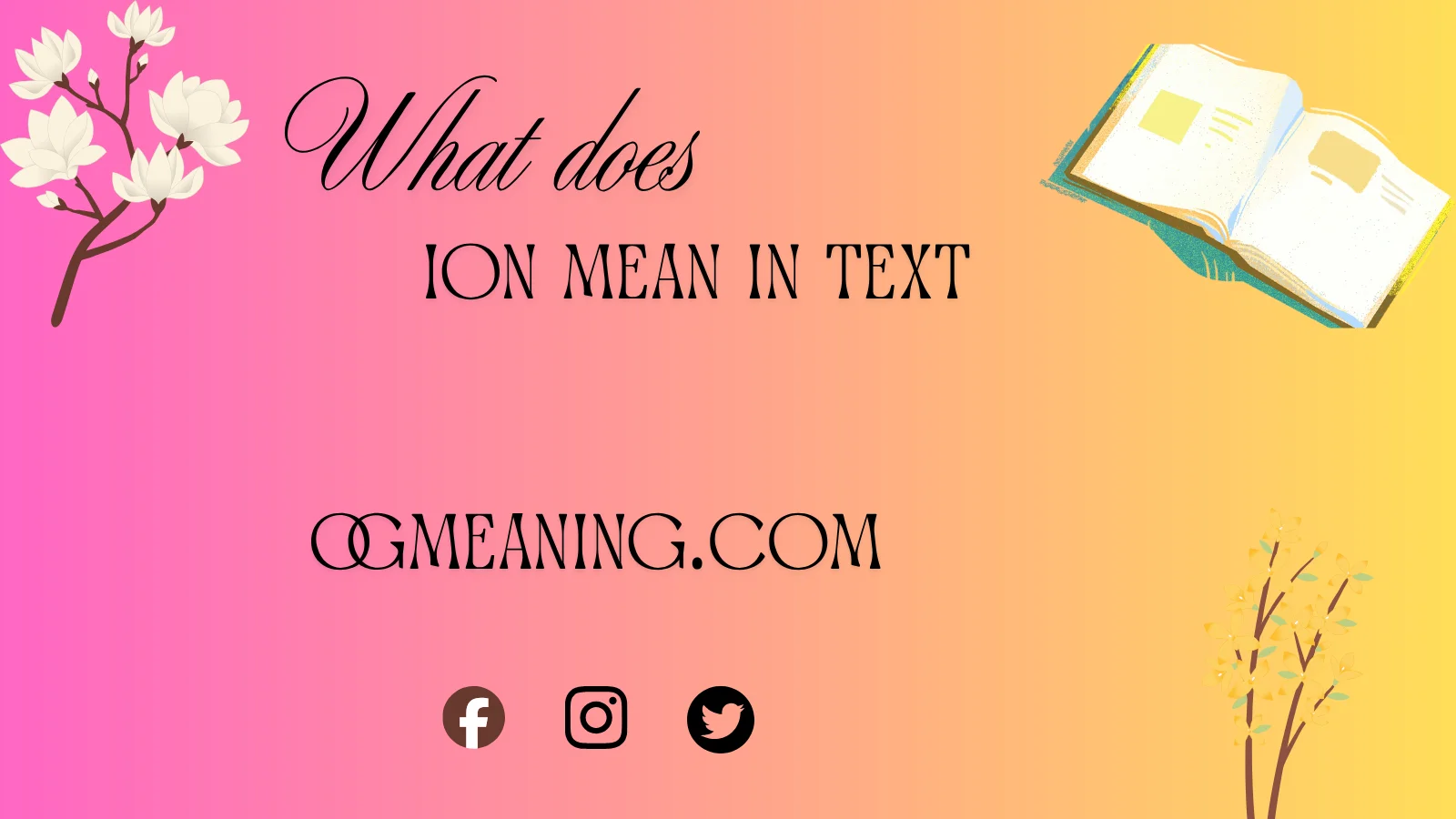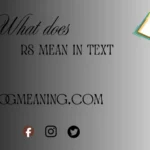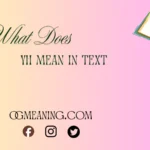Language keeps evolving — and nowhere faster than in texting 💬. You’ve probably seen someone say “ion know” or “ion care” and wondered, what does ion mean in text? Don’t worry — you’re not alone.
In this guide, we’ll break down the real meaning behind “ion”, how it’s used in modern texting, where it came from, and how to use it naturally like a pro. Whether you’re decoding messages from your teen, learning Gen Z slang, or just curious about language trends, this article will clear it all up — with plenty of fun examples and context.
Let’s dive in! 🚀
The Quick Answer: What Does “Ion” Mean in Text?
When someone says “ion” in a text message, they’re actually shortening “I don’t” — often pronounced quickly so it sounds like “ion.”
For example:
- “Ion know what you mean” = “I don’t know what you mean.”
- “Ion care anymore” = “I don’t care anymore.”
👉 So, “ion” = “I don’t” in texting and online slang.
It’s informal, casual, and mostly used in social media, texting, or casual speech — not formal writing.
Where Did “Ion” Come From?
Language evolves from how we speak, not just how we write. The slang “ion” came from the spoken contraction of “I don’t” — when said quickly, the “t” drops, and it sounds like “ion.”
Linguists call this phonetic reduction, a natural way people shorten phrases in everyday speech. Over time, this spoken habit turned into a written form of digital slang, especially on platforms like Twitter, TikTok, and Snapchat.
It’s part of a broader pattern of speech-based writing — where texting mirrors how we actually talk.
Why “Ion” Caught On 🔥
So, why did people start typing “ion” instead of “I don’t”?
Because it’s:
- Faster to type ⏱️
- Looks casual and expressive 😎
- Feels authentic to spoken language
- Used heavily by influencers and Gen Z users
Social media thrives on personality, and typing “ion” adds tone and rhythm to a sentence — making it feel more real, emotional, and conversational.
Example:
“Ion even wanna talk to him rn 😤”
→ conveys frustration and attitude better than “I don’t even want to talk to him right now.”
Common Ways “Ion” Is Used in Texts
Here are some of the most common ways people use “ion” in messages and posts:
| Expression | Meaning | Example |
|---|---|---|
| Ion care | I don’t care | “Ion care what he said.” |
| Ion know | I don’t know | “Ion know where she went.” |
| Ion like that | I don’t like that | “Ion like that energy 😒.” |
| Ion got time | I don’t have time | “Ion got time for drama today.” |
| Ion think so | I don’t think so | “Ion think she’s coming.” |
You’ll often see it paired with slang abbreviations like fr (for real), idc (I don’t care), or ngl (not gonna lie).
How “Ion” Differs From “Ion” in Science ⚡
Here’s where it gets interesting. The word ion also exists in science, where it means an atom or molecule with an electric charge.
But in texting, it has nothing to do with chemistry! 😅
To avoid confusion, context is everything.
Example:
- In text: “Ion like pizza anymore” → means I don’t like pizza anymore.
- In science: “An ion forms when an atom gains or loses electrons.”
So, while the words are spelled the same, their meanings come from completely different worlds — one from chemistry, the other from conversation.
The Linguistic Magic Behind “Ion” 📚
“Ion” isn’t just slang — it’s an example of language evolution in real time.
Linguists note that when people text, they write how they speak. Over time, this reshapes language itself.
Other examples include:
- “Gonna” for “going to”
- “Wanna” for “want to”
- “Cuz” for “because”
- “Ion” for “I don’t”
These short forms spread through pop culture, memes, and music, becoming recognized and widely understood even outside their original circles.
Cultural Influence: How “Ion” Became Mainstream
Slang like “ion” gained popularity through hip-hop lyrics, TikTok captions, and meme culture. When creators and influencers use certain words repeatedly, they quickly spread to mainstream audiences.
Example from social media:
“Ion need nobody to validate my peace ✨”
This kind of statement mixes slang with emotional expression — a hallmark of Gen Z communication. It’s not just about grammar; it’s about attitude and authenticity.
How to Use “Ion” Naturally in Your Texts 💬
If you want to sound natural (and not forced), use “ion” in relaxed, emotional, or humorous contexts.
✅ Good examples:
- “Ion feel like going out tonight.”
- “Ion trust that dude anymore 😅.”
- “Ion even care at this point lol.”
🚫 Avoid using it in:
- Professional messages or emails
- Academic writing
- Formal contexts
Remember — slang works best when your tone matches your audience.
Regional and Social Contexts 🌍
“Ion” is most common in African American Vernacular English (AAVE) and southern U.S. speech patterns. Many slang terms originate from these linguistic traditions before spreading through pop culture and social media.
It reflects a broader pattern of how cultural expressions evolve into mainstream language — just like “lit,” “cap,” or “slay.”
By understanding this, we appreciate not only the word itself but the community-driven innovation behind it.
“Ion” vs. “IDK” — What’s the Difference? 🤔
Although “ion” often replaces “I don’t,” people sometimes use it like “idk” (I don’t know).
Example comparison:
- “Ion know” = “I don’t know”
- “Idk” = “I don’t know”
The difference?
- Tone: “Ion know” sounds more casual or expressive.
- Style: “Idk” feels neutral or typed fast.
Both work fine, but “ion” adds personality to the message.
Examples of “Ion” in Real-Life Texts 💌
Here are a few sample sentences showing how people use “ion”:
- “Ion even mad anymore, I’m just done 😤.”
- “Ion got no energy for fake people rn.”
- “Ion like that outfit, tbh.”
- “Ion think he meant it that way.”
- “Ion remember what time it was 😅.”
Notice how “ion” adds rhythm and emotion, making digital communication feel more spoken.
Why Understanding Slang Matters
Understanding slang like “ion” helps bridge communication gaps between generations, cultures, and communities.
When you know what someone means, you respond better — without judgment or confusion. Plus, it shows cultural awareness and empathy.
As linguist Deborah Tannen once said:
“Language is the glue of social connection — it tells us who we are and how we relate to others.”
So, learning slang isn’t just fun — it’s a form of social literacy.
Common Misunderstandings About “Ion” ❌
Because “ion” looks like the scientific term, some people misinterpret it at first.
Myth: “Ion” means a charged atom.
Reality: In texting, it’s shorthand for “I don’t.”
Myth: It’s incorrect English.
Reality: It’s informal, but it reflects natural spoken patterns.
Myth: Only teens use it.
Reality: Slang spreads quickly — many adults use “ion” online too!
The Psychology of Slang Use 🧠
Using slang like “ion” helps express emotion, identity, and belonging. People often adopt slang that reflects their social group or personality.
In texting, where tone can easily be lost, slang brings back nuance — sarcasm, humor, or attitude. That’s why “ion” feels more expressive than “I don’t.”
It’s not laziness — it’s creativity. 🎨
Expert Insight on Text-Based Language Evolution
Linguists studying digital communication note that texting has become a new dialect of English. It includes rhythm, tone, and even emotional context — much like spoken language.
“Ion” represents how writing adapts to speech patterns — a process known as orthographic innovation. It’s part of how English continues to evolve through technology.
Summary of Key Meanings
| Context | Meaning | Notes |
|---|---|---|
| Texting/Slang | “I don’t” | Informal and conversational |
| Science | Charged atom/molecule | Unrelated to slang |
| Cultural | Expression of emotion/attitude | Popular in Gen Z language |
FAQs About “Ion” in Text
Q1. What does “ion” mean in text?
“Ion” means “I don’t.” It’s a casual shorthand used in texting and social media.
Q2. Is “ion” a real word?
Yes, but it has two meanings — one in science (charged particle) and one in slang (short for “I don’t”).
Q3. How do you pronounce “ion” in slang?
It’s pronounced quickly, almost like “eye-yun” — mimicking how people say “I don’t” in fast speech.
Q4. Is using “ion” considered bad grammar?
Not really — it’s informal but accepted in casual writing. Grammar rules in texting are flexible and context-driven.
Q5. Who started using “ion” in texting?
It originated from African American Vernacular English (AAVE) and spread through social media and music culture.
Conclusion: Final Thoughts 🌟
The next time you see “ion” in a message, you’ll know it simply means “I don’t” — a small word with big cultural impact.
Language never stops evolving, and slang like “ion” reminds us how creative communication can be. Whether it’s used in humor, frustration, or casual chat, it brings real emotion to digital spaces.
So go ahead — use it naturally, enjoy the rhythm of modern language, and remember: every text you send adds a new layer to the story of how humans connect. 💬✨


